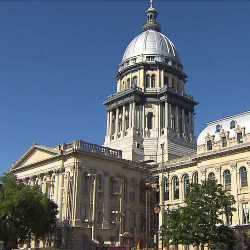Future Of The US Online Gambling Industry

The USA’s gambling industry has continued to expand over the past few years leading to a surge in the number of Americans buying lottery tickets, and playing slots and table games at casinos. In fact, casinos can now be found in 17 of the country’s 50 states, while for Native American casinos that figure rises to 28 states, and according to a recent report released by Rubin Brown commercial and tribal casinos generated a combined $66.3 billion of revenues in 2013, up 1.6% from the $65.24 billion reported in 2012.
Nevertheless, the industry has matured and reached a saturation point as local casino markets compete with each other for a share of a finite number of gamblers, and since 2007 Nevada had seen its share of the US gambling revenues decline from 34% to 29% as states such as Maryland, Ohio and Kansas expand their presence in the country’s gambling market. Consequently, cash strapped states desperate for new sources of income have been turning their attention increasingly towards online gambling, which is believed to generate more than $4 billion of revenues in the US each year, including unlicensed sites, but to date just Nevada, Delaware and New Jersey have regulated their iGaming markets. Therefore, what future does online gambling have in the world’s biggest economy?
Online Gambling History
Despite the Federal Wire Act (1961), in 1999 more than 250 gambling websites accepted wagers from US citizens on sports events, card games or lottery tickets. In 2006, Congress subsequently passed the SAFE Port Act, which was primarily an anti-terrorism bill, although an amendment was later added called the Unlawful Internet Gambling Enforcement Act (UIGEA) which gave the federal government the power to bring felony charges against unauthorized online gambling business operators. As a result, all the publicly owned gambling companies withdrew from the USA, including PartyPoker which up until then had dominated the U.S. poker market, leaving PokerStars to rake in millions of dollars in profits.
When the Department of Justice seized PokerStars, Full Tilt Poker and Absolute Poker domains on ”Black Friday” in 2011, PokerStars had already grown to become the undisputed global poker leader, in spite of having to shell out a huge $731 million to settle its civil lawsuit with the DoJ. The website has remained in its enviable position every since, and by December 23rd the DoJ revised its interpretation of the federal Wire Act to allow online poker and gambling on a state by state basis, thus paving the way for territories such as Delaware, Nevada and New Jersey to allow online gambling in their states.
Future Of US Online Gambling
More than a year and a half has passed since New Jersey became the third state to regulate online gambling, with analysts predicting the next states to follow suit are likely to include California, Iowa, Hawaii, Massachusetts and Pennsylvania. As the experts have pointed out, as many as 10,000 high-tech jobs could be created in the eventuality of further iGaming expansion, as well as an estimated $2 billion in extra annual tax revenues for individual state and the federal government. Even this figure seems conservative, too, as the 2003 to 2010 period saw US residents gamble around $30 billion online at a time when the government was hostile to the activity.
Online Gambling Here To Stay
Sheldon Adelson and his ‘Coalition To Stop Internet Gambling’ has attracted a great deal of coverage in the media, and in February Representative Jason Chaffetz (R-Utah) introduced to the House his Restoration of America’s Wire Act (RAWA), which seeks to “prohibit all forms of Internet gambling” in the America, excluding sports betting, horse racing and fantasy sports.
However, political analyst believe RAWA is a low priority topic for Congress and as a non-partisan issue is unlikely to attract much support from politicians, who in any case may be unwilling to tear down a nascent industry which has already attracted millions of dollars in investment from operators in the country’s three regulated states. Furthermore, online gambling legislation offers an important means by which individual states can top up their cash starved coffers, and any attempts to shut the industry down will meet fierce resistance from opposition groups, such as the Poker Players Alliance, and the Campaign for Liberty. As C4L President John Tate commented recently:
“After successfully selling the American people on taking the United States in a new direction, members of the GOP think one of its first legislative priorities should be to limit economic freedom, impose top-down federal regulations, and expand the surveillance state.. I urge Campaign for Liberty members and all Americans who value Internet freedom and free markets, even if they don’t gamble, to contact their legislators and tell them to oppose the ‘Restoration of America’s Wire Act.’”










